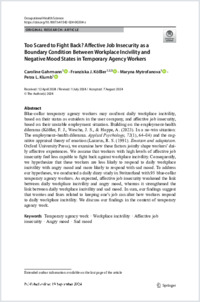Too Scared to Fight Back? Affective Job Insecurity as a Boundary Condition Between Workplace Incivility and Negative Mood States in Temporary Agency Workers
PSPE
- Gahrmann, Caroline ORCID Department of Psychology, University of Fribourg, Switzerland
- Kößler, Franziska ORCID Department of Psychology, University of Fribourg, Switzerland. Department of Psychology, Humboldt University of Berlin, Germany. Institute for Management & Organization (IMO), Leuphana Universität Lüneburg, Germany
- Mytrofanova , Maryna ORCID Department of Psychology, University of Fribourg, Switzerland
- Klumb, Petra Liselotte ORCID Department of Psychology, University of Fribourg, Switzerland
- 2024
Published in:
- Occupational Health Science. - 2024, p. 1-21
English
Blue-collar temporary agency workers may confront daily workplace incivility,
based on their status as outsiders in the user company, and affective job insecurity,
based on their unstable employment situation. Building on the employment-health
dilemma (Kößler, F. J., Wesche, J. S., & Hoppe, A. (2023). In a no-win situation:
The employment–health dilemma. Applied Psychology, 72(1), 64–84) and the cognitive
appraisal theory of emotion (Lazarus, R. S. (1991). Emotion and adaptation.
Oxford University Press), we examine how these factors jointly shape workers’ daily
affective experiences. We assume that workers with high levels of affective job
insecurity feel less capable to fight back against workplace incivility. Consequently,
we hypothesize that these workers are less likely to respond to daily workplace
incivility with angry mood and more likely to respond with sad mood. To address
our hypotheses, we conducted a daily diary study in Switzerland with 95 blue-collar
temporary agency workers. As expected, affective job insecurity weakened the link
between daily workplace incivility and angry mood, whereas it strengthened the
link between daily workplace incivility and sad mood. In sum, our findings suggest
that worries and fears related to keeping one’s job can alter how workers respond
to daily workplace incivility. We discuss our findings in the context of temporary
agency work.
based on their status as outsiders in the user company, and affective job insecurity,
based on their unstable employment situation. Building on the employment-health
dilemma (Kößler, F. J., Wesche, J. S., & Hoppe, A. (2023). In a no-win situation:
The employment–health dilemma. Applied Psychology, 72(1), 64–84) and the cognitive
appraisal theory of emotion (Lazarus, R. S. (1991). Emotion and adaptation.
Oxford University Press), we examine how these factors jointly shape workers’ daily
affective experiences. We assume that workers with high levels of affective job
insecurity feel less capable to fight back against workplace incivility. Consequently,
we hypothesize that these workers are less likely to respond to daily workplace
incivility with angry mood and more likely to respond with sad mood. To address
our hypotheses, we conducted a daily diary study in Switzerland with 95 blue-collar
temporary agency workers. As expected, affective job insecurity weakened the link
between daily workplace incivility and angry mood, whereas it strengthened the
link between daily workplace incivility and sad mood. In sum, our findings suggest
that worries and fears related to keeping one’s job can alter how workers respond
to daily workplace incivility. We discuss our findings in the context of temporary
agency work.
- Faculty
- Faculté des lettres et des sciences humaines
- Department
- Département de Psychologie
- Language
-
- English
- Classification
- Psychology
- License
- Open access status
- hybrid
- Identifiers
-
- DOI 10.1007/s41542-024-00204-z
- ISSN 2367-0134
- Persistent URL
- https://folia.unifr.ch/unifr/documents/329860
Statistics
Document views: 64
File downloads:
- gahrmannetal2024ohs: 78
